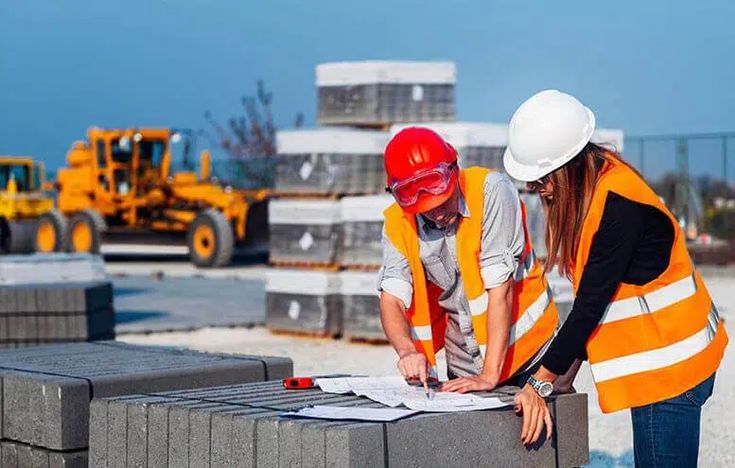Construction Jobs in Canada That Offer Work Visa Sponsorship
Canada’s construction industry is a cornerstone of its economy, providing employment to a vast number of workers and contributing significantly to the nation’s infrastructure development. The industry encompasses a wide range of roles, from skilled trades to professional services, each playing a crucial part in the construction lifecycle. For foreign workers, securing a job in this sector can be a pathway to immigration through work visa sponsorship.
Find your Eligibility for FREE!!
Why Choose Canada for Construction Jobs?
Canada stands out as a premier destination for construction professionals seeking stable, rewarding careers. With its robust economy, high industry standards, and diverse job opportunities, Canada offers an attractive environment for both local and international workers. Let’s delve into the compelling reasons why Canada is an excellent choice for construction jobs, particularly for those seeking work visa sponsorship.
Economic Stability
Canada’s economic stability is one of the primary reasons it attracts workers from around the globe. The country’s robust job market and steady economic growth provide a secure environment for construction professionals. The construction industry is a significant contributor to Canada’s GDP, creating numerous job opportunities across various sectors.
Robust Job Market
The Canadian job market is known for its resilience and diversity. The construction sector, in particular, has shown consistent growth, driven by both public and private investments. This growth translates into a high demand for skilled workers, including project managers, civil engineers, electricians, and more. The stability of the job market ensures that construction professionals can build long-term careers with confidence.
Infrastructure Investment
Canada’s commitment to infrastructure development is evident in its substantial investments in public infrastructure projects. These investments create numerous job opportunities and contribute to the country’s economic growth. From transportation networks to energy infrastructure, Canada’s focus on development ensures a steady flow of construction projects.
High Standards in the Construction Industry
Canada’s construction industry is renowned for its high safety and quality standards. These standards ensure a safe working environment and contribute to the longevity and reliability of construction projects.
Safety Standards
Safety is a top priority in the Canadian construction industry. Stringent safety regulations and guidelines ensure that workers are protected from hazards. Employers are required to provide safety training and equipment, creating a secure working environment. This focus on safety not only protects workers but also enhances productivity and job satisfaction.
Quality Assurance
The construction industry in Canada adheres to rigorous quality standards. These standards ensure that buildings and infrastructure are durable, efficient, and sustainable. Quality assurance processes are in place to monitor and maintain high standards throughout the construction lifecycle. This commitment to quality makes Canada an attractive destination for construction professionals who value excellence in their work.
Diverse Opportunities in the Construction Sector
The construction industry in Canada offers a wide range of roles, catering to various skills and interests. Whether you are a technical expert, a skilled tradesperson, or a managerial professional, there are opportunities to suit your career aspirations.
Technical and Skilled Trades
Technical and skilled trades form the backbone of the construction industry. Roles such as electricians, plumbers, carpenters, and masons are in high demand. These professions require specialized skills and certifications, offering rewarding careers with competitive salaries. For those interested in hands-on work, these roles provide ample opportunities for growth and development.
Managerial Positions
Managerial positions in the construction industry offer leadership roles with significant responsibilities. Project managers, construction managers, and site supervisors play crucial roles in overseeing construction projects. These positions require strong organizational skills, leadership abilities, and technical knowledge. Managerial roles offer competitive salaries and opportunities for career advancement.
Engineering Roles
Engineering roles, such as civil engineers, structural engineers, and mechanical engineers, are essential in the construction industry. These professionals design and manage the construction of infrastructure projects, ensuring they meet safety and quality standards. Engineering roles offer challenging and rewarding careers, with opportunities for specialization and advancement.
Immigration Pathways and Work Visa Sponsorship
For international workers, Canada offers numerous immigration pathways, making it easier to secure work visas and build a career in the construction industry. Many construction companies in Canada offer work visa sponsorship, facilitating the immigration process for foreign workers.
Work Visa Sponsorship
Work visa sponsorship is a significant advantage for international workers seeking construction jobs in Canada. Employers who offer visa sponsorship support your application for a work permit, making the immigration process smoother. This sponsorship can open doors to permanent residency and citizenship, providing a pathway to long-term career growth in Canada.
Express Entry Program
The Canadian Express Entry program is a popular immigration pathway for skilled workers. This program allows eligible candidates to apply for permanent residency based on their skills, work experience, and language proficiency. The Express Entry program is particularly beneficial for construction professionals with in-demand skills. For more information on how to apply, you can refer to resources like How to Apply for the Canadian Express Entry Program in 2025.
Provincial Nominee Programs
Provincial Nominee Programs (PNPs) offer another pathway to permanent residency in Canada. These programs allow provinces and territories to nominate candidates who meet their specific labor market needs. Construction professionals with skills in high demand may be eligible for nomination through a PNP, facilitating their immigration process.
Additional Benefits of Working in Canada
Beyond the economic stability and high industry standards, Canada offers additional benefits that make it an attractive destination for construction professionals.
Quality of Life
Canada is known for its high quality of life, with excellent healthcare, education, and social services. The country’s diverse culture, natural beauty, and vibrant communities provide a welcoming environment for new immigrants. Whether you choose to live in a bustling city or a quiet town, Canada offers a range of lifestyle options to suit your preferences.
Support for New Immigrants
Canada provides various support programs for new immigrants, helping them settle and integrate into Canadian society. These programs offer assistance with housing, employment, language training, and more. For example, resources like Government Assistance Programs for New Immigrants in Canada provide valuable information on the support available to new immigrants.
Affordable Housing Options
Finding affordable housing is a crucial aspect of settling in a new country. Canada offers various housing options to suit different budgets and preferences. Resources like Affordable Temporary Housing Options for Immigrants in Canada provide guidance on finding budget-friendly accommodation.
Types of Construction Jobs in Canada
1. Project Managers
Project managers oversee construction projects from start to finish, ensuring they are completed on time, within budget, and to the required quality standards. They coordinate with various stakeholders, including clients, architects, engineers, and subcontractors.
- Responsibilities: Planning, budgeting, scheduling, and managing resources.
- Requirements: A degree in construction management, engineering, or a related field, along with relevant experience and certifications.
2. Civil Engineers
Civil engineers design and manage the construction of infrastructure projects such as roads, bridges, and buildings. They play a crucial role in ensuring the structural integrity and safety of these projects.
- Responsibilities: Designing and analyzing structures, managing construction sites, and ensuring compliance with regulations.
- Requirements: A degree in civil engineering and relevant certifications.
3. Electricians
Electricians install, maintain, and repair electrical systems in buildings and infrastructure. They work with various electrical components, including wiring, circuit breakers, and control systems.
- Responsibilities: Installing electrical systems, troubleshooting electrical issues, and ensuring compliance with electrical codes.
- Requirements: Completion of an apprenticeship program and relevant certifications.
4. Plumbers
Plumbers work on piping systems for water supply, heating, and sanitation. They install, maintain, and repair pipes and fixtures in residential, commercial, and industrial buildings.
- Responsibilities: Installing and repairing piping systems, troubleshooting plumbing issues, and ensuring compliance with plumbing codes.
- Requirements: Completion of an apprenticeship program and relevant certifications.
5. Carpenters
Carpenters construct, repair, and install building frameworks and structures made from wood and other materials. They work on various projects, including residential homes, commercial buildings, and infrastructure.
- Responsibilities: Building and repairing structures, installing fixtures, and ensuring compliance with building codes.
- Requirements: Completion of an apprenticeship program and relevant certifications.
6. Masons
Masons specialize in building structures using materials like brick, stone, and concrete. They work on various projects, including residential homes, commercial buildings, and infrastructure.
- Responsibilities: Building and repairing structures, installing fixtures, and ensuring compliance with building codes.
- Requirements: Completion of an apprenticeship program and relevant certifications.
7. Heavy Equipment Operators
Heavy equipment operators operate machinery such as cranes, bulldozers, and excavators. They play a crucial role in construction projects, moving materials and preparing sites for construction.
- Responsibilities: Operating heavy equipment, maintaining machinery, and ensuring compliance with safety regulations.
- Requirements: Completion of a training program and relevant certifications.
8. Construction Laborers
Construction laborers perform various tasks involving physical labor at construction sites. They assist with tasks such as demolition, site preparation, and material handling.
- Responsibilities: Performing physical labor, assisting with construction tasks, and ensuring compliance with safety regulations.
- Requirements: On-the-job training and relevant certifications.
Work Visa Sponsorship for Construction Jobs
Securing a construction job in Canada that offers work visa sponsorship can be a game-changer for foreign workers. Visa sponsorship means that the employer is willing to support your application for a work permit, making the immigration process smoother. Here’s how you can navigate this process:
Steps to Secure a Construction Job with Visa Sponsorship
-
Research and Identify Opportunities: Start by identifying construction companies in Canada that are known for sponsoring work visas. Job portals, company websites, and networking platforms can be valuable resources.
-
Tailor Your Resume and Cover Letter: Highlight your relevant skills, experience, and certifications. Emphasize any projects you’ve worked on that are similar to those in Canada.
-
Apply for Jobs: Submit your application to companies that offer visa sponsorship. Be proactive and follow up on your applications to show your interest and commitment.
-
Prepare for Interviews: Familiarize yourself with Canadian construction standards and regulations. Be ready to discuss your experience and how you can contribute to the company.
-
Work Permit Application: Once you receive a job offer, your employer will guide you through the work permit application process. You may need to provide documents such as your passport, educational certificates, and work experience letters.
Requirements for Work Visa Sponsorship
- Educational Qualifications: A degree or diploma in a relevant field can enhance your eligibility.
- Work Experience: Prior experience in construction projects similar to those in Canada.
- Language Proficiency: Proficiency in English or French, depending on the province.
- Certifications: Relevant certifications can boost your application, such as those from the Canadian Construction Association (CCA).
Improving Your Chances of Getting Hired
To stand out among other applicants, consider the following tips:
- Networking: Connect with professionals in the Canadian construction industry through platforms like LinkedIn.
- Skill Development: Continuously update your skills and obtain relevant certifications.
- Language Skills: Improve your English or French language skills to meet the communication requirements of the job.
For more detailed strategies, you can refer to resources like Improve Chances of Getting Hired in Canada.
Living and Working in Canada
Once you secure a construction job with visa sponsorship, the next step is to plan your move to Canada. Here are some aspects to consider:
Accommodation
Finding affordable housing is crucial. Explore options like Finding Cheap Apartments in Canada as a New Immigrant. These resources can guide you in finding suitable and budget-friendly accommodation.
Cost of Living
The cost of living varies across Canadian cities. Research the Cheapest Cities in Canada to Live as a New Immigrant to make an informed decision about where to settle.
Government Assistance
New immigrants can benefit from various Government Assistance Programs for New Immigrants in Canada, which offer support in areas like healthcare, education, and employment.
Alternative Job Opportunities in Canada
While construction jobs are lucrative, there are other sectors that offer visa sponsorship and are worth exploring:
- Pet Care Jobs: If you have a passion for animals, consider roles like Pet Care Jobs in Canada or Dog Training Jobs in Canada.
- Fruit Picking: For those who enjoy outdoor work, Fruit Picker Jobs in Canada offer a unique opportunity.
- Warehouse Work: The logistics sector is booming, with many High Paying Warehouse Worker Jobs in Canada available.
- Caregiving: Roles like Care Assistant Jobs in Canada are in high demand and offer competitive salaries.
Visa Application Process
Navigating the visa application process can be complex, but with the right guidance, it can be manageable. Here are some steps to help you through the process:
- Gather Required Documents: Ensure you have all the necessary documents, including your passport, educational certificates, and work experience letters.
- Complete the Application Form: Fill out the application form accurately and truthfully.
- Pay the Application Fee: Pay the required fee for your visa application.
- Attend the Interview: Prepare for the visa interview by familiarizing yourself with common questions and practicing your responses.
- Wait for Processing: The processing time for visa applications can vary, so be patient and follow up as needed.
For more detailed guidance, you can refer to resources like How to Apply for a Canadian Work Visa Without a Job Offer.
Conclusion
Securing a construction job in Canada with work visa sponsorship can open doors to a rewarding career and a high quality of life. By understanding the application process, meeting the requirements, and leveraging available resources, you can significantly enhance your chances of success. Whether you choose to pursue a career in construction or explore other sectors, Canada offers a wealth of opportunities for skilled and motivated individuals.
For further reading on visa sponsorship and job opportunities in Canada, explore resources like How to Apply for a Canadian Work Visa Without a Job Offer. These guides provide additional insights and strategies to help you navigate the immigration process and secure your dream job in Canada.
By following these steps and utilizing the resources available, you can increase your chances of securing a construction job in Canada with work visa sponsorship and embark on a successful career in the construction industry.







